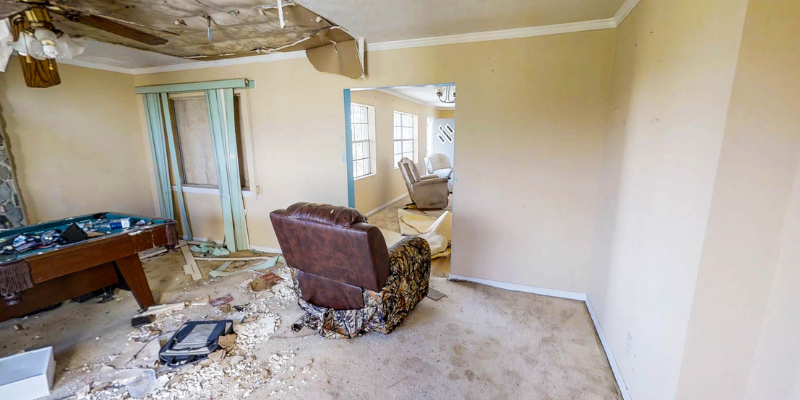
Understanding Tenant Damage: Legal Definitions and Implications
Understanding the law specific to tenant damages will require understanding the rental housing concept in Illinois. In simple terms, ‘tenant damage’ is defined exclusively in Illinois as some form of destruction or detrimental action done to a house or space beyond typical wear and tear.
This differentiation between normal wear and wear damage is critical as it impacts security deposits after a lease period. Based on Illinois regulations, landlords retain the right to charge for repairs against a security deposit provided such damage goes beyond reasonable depreciation.
By law, ex-tenants should receive a detailed list of deductions within one month after leaving the property. Comprehending these terms empowers both sides legally to safeguard their rights concerning maintenance and usage of the property, thereby complying with local laws, customary benchmarks, and principles of equity.
Knowing the distinction between damage and wear and tear assists tenants in contesting dubious charges brought against them. Comprehensive records, such as photographs taken before and after an inspection, give a landlord’s claim for damages more substantiating evidence.
This balance aims to protect both parties’ interests while maintaining property integrity throughout tenancy agreements in Illinois.
Common Causes of Tenant Damage in Rental Properties
In Illinois, tenant damages concerning rental properties can arise from several common causes that impact landlords and tenants. Wear and tear are inevitable over time on any property. However, some renters’ neglect or misuse of the property increases damage beyond what most property owners would classify as usual.
Damage done accidentally can include spills resulting in stains or broken door handles due to mishandling, which are common among renters. Moreover, anything to do with pets matters a great deal, too, since there are countless scratches on the floors and walls, and other worrying odors that tend to linger around often.
Tenant actions lacking landlord consent can sometimes lead to unapproved changes that are the essence of a dwelling unit’s structural damage or residential code noncompliance. Neglecting basic cleaning chores and minor maintenance tasks can worsen more complicated problems.
In addition, excessive occupation of a rental space may cause other units or buildings to lose plumbing and common areas due to pipe constricting works or loss of their value, resulting in crippled systems due to plaster screeding damages. Awareness of these issues helps owners and renters improve integral management systems and minimize risks of tenant harm within rental homes with almost no restrictions in Illinois.
Assessing Property Damage: A Guide for Landlords
When assessing property damage in rental properties in Illinois, landlords must carefully evaluate the condition of the unit to determine if any tenant-caused damage has occurred beyond normal wear and tear. Equally important, landlords should inspect the property with potential tenants before and after their stay, taking photographs and noting any damages for future reference.
This factual evidence helps in case arguments concerning the charges applied to the security deposit or maintenance obligations. Landlords are bound by law, like every other citizen in the state of Illinois, regarding what is required of him or her in terms of tenant relations; therefore, she has to be aware of his or her rights not only as a tenant but also as a landlord to damage claims.
It is essential to recognize what regular and unusual maintenance entails. Normal wear might include light carpet fraying or modest wall scuffs, broken windows, and severely stained carpets designated as damaged. Communication with the tenant throughout the lease term can minimize voids of expectation regarding maintenance duties, encourage responsibility towards property upkeep, and tend to preemptive maintenance.
Remembering all the key legal points and recording everything precisely assists landlords in avoiding unintentional losses during maintenance. This practice protects the rental properties and minimizes costs from tenant carelessness or accidental damage. Reliable Cash Buyers can assist in documenting procedures and ensuring compliance to safeguard your investment further.
Tenant Damage Vs. Normal Wear and Tear: Key Differences
In Illinois, accurately identifying tenant damage and wear and tear is essential for both the landlord and the tenant regarding maintenance and management of security deposits. For instance, considerable degradation occurs from shredding a rental house or tearing it apart, resulting in significant depreciation. Under normal circumstances, the user usually bears liability for most damages accompanying losses.
This would cause windows to be destroyed and walls to have huge holes. Evolutionary Damage pertains to active tenancy damage caused by inferior diaconal gold suits property management practices that affect unwanted changes, which are beneficial in result yet detrimental overall.
In contrast, normal wear and tear encompasses the gradual deterioration that occurs naturally over time, such as faded paint, minor scuffs on wooden floors, or slight carpet fraying. Recognizing these distinctions assists landlords in making educated decisions regarding repair expenses and deposit deductions while safeguarding tenants from unfair fees.
Both parties need to set expectations in their leasing contracts to avoid disagreements over the property’s condition at the lease’s conclusion. If known, some areas within Illinois law surrounding rental properties would help deal with these matters effectively and maintain good relations with landlords.
Legal Responsibilities of Tenants Regarding Property Damage

In Illinois, renters have particular obligations concerning harm caused to rental units. Legally, every tenant is responsible for maintaining and safeguarding the rental unit from any potential damage, except for everyday wear and tear over time.
Preventive measures also fall within a tenant’s duties, requiring them to notify the landlord of any needed repairs. If left unaddressed, they would lead to more damage and not inflict intentional or unintentional harm to the rental unit.
If a renter or visitor causes damage beyond normal property wear and tear, they can potentially face charges for repairs. According to Illinois law, the Residential Tenants’ Right to Repair Act gives the landlord the right to deduct repair costs from the security deposit if the tenant does not remedy the damages they caused.
Landlords are also obligated to give an itemized statement with all repair charges within thirty days after the end of tenancy, showing what damages were done and what costs were incurred. Knowing these rights is essential for renters to ensure a pleasant renting experience while protecting the integrity of the home in question. For guidance on tenant rights or landlord obligations, contact us.
Managing Tenant-Induced Property Damage in Illinois Rentals
Addressing property damage caused by tenants in an Illinois rental requires knowing the rights and duties of both parties. Illinois landlords need to conduct as-built inspections during move-in and verbosely capture the property’s condition using notes and pictures.
These records benefit all parties involved during disputes full of disagreements regarding damages done by tenants due to the lease settlement. For landlords, it is best to simultaneously outline within their contracts what normal wear and tear is alongside tenant-induced damage so that there is clarity with no room for misunderstanding.
Tenants, on their part, must report any issues or necessary repairs promptly to prevent further deterioration that might be considered neglectful. Creating an open communication channel between a landlord and a tenant allows both sides to resolve issues efficiently and build working relationships that promote mutually advantageous resolutions. Here, solving problems is a two-way street.
Equally, landlords may want to instate periodic property inspections to ensure proactive problem identification, and tenants ought to be invited to uphold the condition of the rental throughout their occupancy period. Recognition of these factors could mitigate tenant-caused damage over time concerning properties in Illinois.
Steps to Document and Report Tenant Damage Effectively
In Illinois, proper documentation and reporting of tenant damage on rental properties requires a specific procedure that both landlords and tenants must abide by to make understanding the situation easy. Make sure to assess the property’s baseline condition before move-in; this includes any pre-existing issues.
For a complete recording of the property, capture every room and issue with high-resolution photography or video recording—capture notes for all participant objectives. In cases where damage occurs, it is in the landlord’s best interest to photodocument every piece of evidence so a sample can be produced to prove the current condition post-inspection.
Tenants should be informed immediately about the findings, allowing them an opportunity to provide their perspective or explanation. Written communication is key; therefore, both parties should exchange formal written notices detailing the damage and any proposed remedies or actions required.
Using email or certified mail as a mode of communication helps document important interactions and agreements, thereby reducing conflicts down the line. In Illinois, for example, landlords should consider relevant provisions pertaining to repair and maintenance responsibilities prior to outsourcing such functions to tenants.
Professional assessments from contractors or property inspectors may provide a detailed analysis justifying claims about extra restoration work and expert evaluation estimates of applicable costs. Addressing all angles protects the landlord while defining terms, documenting the compliant tenant agreement for organized records, enduring chronological communications alongside inspections, maintenance routines, and subsequent estimated repair invoices.
How to Handle Disputes Over Property Damage with Tenants
In Illinois, resolving disputes between landlords and tenants over property damage requires consideration of the laws within the state. Both parties must also practice effective communication. There should be an appreciation of the lease agreement by both sides, which encapsulates the responsibilities from either the maintenance of the rental unit or actions categorized as damaging during its use.
All types of documentation regarding the property are also vital, as are regular inspections. Landlords should inspect and document through writing and photos, not just after tenancy but before, too. After any such documented damages, prompt written notification with specific details outlining the potential for recovering security deposit money, including an outline of proposed deductions, must be issued.
Tenants should be allowed to respond to or dispute the claims with their evidence. Mediation can be a valuable tool when direct negotiations stall, providing an impartial forum to resolve conflicts without legal action.
Understanding Illinois-specific regulations regarding security deposits and tenant rights is essential to ensure compliance and fairness in resolving such disputes, ultimately fostering a cooperative relationship between landlords and tenants.
Preventive Measures for Minimizing the Risk of Tenant Damage

To minimize the risk of tenant damage in rental properties in Illinois, landlords and tenants can implement several preventive measures that foster a harmonious living environment and safeguard property investments. Landlords should conduct thorough tenant screenings and check credit histories and references to ensure they lease to responsible individuals.
Clear communication of lease terms is crucial, and detailed clauses regarding maintenance responsibilities and potential penalties for damages should be included. Regular property inspections, ideally every six months, allow landlords to identify issues and address them promptly.
Providing tenants with guidance on proper maintenance, such as reporting repairs or avoiding common pitfalls like plumbing misuse, can prevent minor problems from escalating into significant damage. Educating tenants about their obligations under Illinois law empowers them to uphold their part of the rental agreement.
By establishing open lines of communication and encouraging prompt reporting of any issues, both parties can work collaboratively to maintain the property’s condition throughout the tenancy.
Security Deposits: Using Them to Address Tenant Property Damages
In Illinois, security deposits are crucial in addressing tenant property damages. Landlords are permitted to use security deposits to cover the cost of repairs for any damage beyond normal wear and tear caused by tenants during their tenancy.
Understanding what constitutes normal wear and tear versus tenant damage is essential for landlords and tenants to prevent disputes. Landlords must thoroughly document the condition of the rental property before and after occupancy through detailed inspections and photographs.
This documentation indicates if deductions from the security deposit are necessary due to tenant-caused damages. Illinois law requires landlords to return the security deposit within 45 days after lease termination, along with an itemized statement of any deductions made for repairs.
Tenants should know they have the right to request a walk-through inspection before moving out and can contest any unjustified claims against their security deposit. By clearly outlining expectations regarding property maintenance in the lease agreement, landlords can minimize misunderstandings about what costs are covered by the security deposit when addressing tenant property damages.
The Role of Lease Agreements in Addressing Potential Tenant Damage
Lease agreements are critical in addressing potential tenant damage to rental properties in Illinois. These legally binding documents outline landlords’ and tenants’ responsibilities and expectations regarding property maintenance and damage prevention.
A well-drafted lease agreement specifies what constitutes tenant damage versus normal wear and tear, helping to mitigate disputes. It should include clauses that detail the tenant’s obligation to maintain the property in good condition, report any necessary repairs promptly, and cover costs for damages beyond ordinary wear.
Lease agreements explicitly define these terms, providing landlords with a solid framework for holding tenants accountable and protecting them from unfair claims. Additionally, including information about security deposits within the lease can further safeguard landlords by ensuring funds are available to repair any legitimate damages caused by tenants.
In Illinois, ensuring compliance with state laws concerning rental agreements is essential for both parties to avoid legal complications related to tenant damage issues.
State-Specific Laws on Tenant Liability for Property Damage
Understanding state-specific laws regarding tenant liability for property damage is crucial for landlords and Illinois tenants. The Illinois Security Deposit Return Act defines how security deposits can cover damages beyond normal wear and tear.
Landlords are permitted to withhold from the deposit amounts necessary to repair tenant-caused damages. Still, they must provide an itemized statement within 30 days of the tenant’s move-out if they intend to do so. Additionally, under the Illinois Landlord and Tenant Act, tenants are responsible for any negligence or willful misconduct that results in property damage.
Landlords must include detailed clauses in their lease agreements specifying tenants’ obligations concerning property care and outlining procedures for addressing disputes over damages. Tenants should be aware that failing to report maintenance issues promptly could potentially leave them liable for any resulting damage due to neglect.
Moreover, landlords should conduct thorough inspections before and after tenancy periods, documenting any existing conditions at move-in and assessing changes upon move-out, ensuring transparency and protecting both parties’ rights under Illinois law. Such documentation can also support a fair offer from cash home buyers in Decatur and surrounding cities in Illinois when evaluating a property’s condition.
Navigating Small Claims Court for Unresolved Tenant Damages
Navigating small claims court for unresolved tenant damages in Illinois can be critical for landlords seeking compensation when tenant disputes remain unsettled. Landlords must ensure that the damage exceeds normal wear and tear and document evidence meticulously, including photos, receipts, and repair estimates.
In Illinois, small claims courts handle up to $10,000 cases, making them an ideal venue for many landlord-tenant disputes. Before filing a claim, landlords should attempt to communicate with tenants to resolve the issue amicably, which might involve sending a formal demand letter outlining the damages and associated costs.
If these efforts fail, filing a small claims suit requires completing the necessary paperwork at the county courthouse where the rental property is located. Both parties should prepare to present their case effectively by organizing all relevant documentation and witnesses that support their position.
Landlords must understand the legal process thoroughly, as it varies from one jurisdiction to another within Illinois. Familiarizing oneself with local rules and procedures can significantly affect the case outcome.
While attorneys are not required in small claims court, consulting with one may provide valuable insights into presenting a compelling case or understanding potential defenses offered by tenants.
Strategies for Conducting Thorough Move-in and Move-out Inspections

Conducting thorough move-in and move-out inspections is crucial for landlords and Illinois tenants to assess tenant damage to rental properties accurately. A detailed inspection at the beginning of a tenancy establishes a clear baseline of the property’s condition, protecting both parties from potential disputes.
Landlords should document every aspect of the property with high-resolution photos or videos, capturing everything from floors and walls to appliances and fixtures. Tenants are encouraged to participate actively in this process, noting any pre-existing issues on a checklist provided by the landlord.
At the end of the lease term, a comprehensive move-out inspection should be conducted using the same checklist as a reference point. This allows for an objective comparison between the initial condition and any changes that may have occurred during occupancy. A company that buys houses in Peoria and other Illinois cities may also consider such documentation valuable when assessing property condition and potential repair costs.
By maintaining meticulous records throughout these inspections, landlords can more easily determine what constitutes normal wear and tear versus actual tenant damage, thus facilitating fair security deposit returns or necessary repair charges.
Repair and Restoration Best Practices After Significant Tenant Damage
Addressing repair and restoration after significant tenant damage in rental properties requires a strategic approach for Illinois landlords and tenants. First, it is crucial to conduct a thorough inspection to assess the extent of the damage, documenting everything with photos and detailed notes.
This documentation not only aids in determining responsibility but also plays a critical role if legal action becomes necessary. Landlords should consult Illinois state laws to understand their rights and obligations regarding repairs and ensure compliance with local regulations.
Establishing clear communication with tenants can facilitate cooperation during the repair process, potentially speeding up resolution. Hiring licensed professionals for significant repairs ensures that work meets safety standards and building codes, thereby protecting property value.
Both parties may benefit from reviewing the lease agreement to clarify responsibilities for specific damages. Exploring insurance options, such as renters’ or landlord insurance, can provide financial relief and cover costs associated with unexpected damages.
Ultimately, following these best practices promotes efficient restoration while minimizing disputes between landlords and tenants in Illinois rental properties.
The Impact of Negligence on Liability for Rental Property Damages
In Illinois, understanding the implications of negligence on liability for rental property damages is crucial for landlords and tenants. Negligence can significantly affect who bears responsibility when damage occurs in a rental property.
Suppose a tenant’s negligence leads to damage, such as failing to report a water leak that results in extensive water damage or neglecting routine maintenance like changing HVAC filters. In that case, the tenant may be held financially liable for repairs. Conversely, if a landlord neglects their duty to maintain safe living conditions or fails to address known hazards promptly, they might be liable for any resultant damages.
Distinguishing between normal wear and tear and negligent damage is essential, as landlords cannot hold tenants responsible for unavoidable deterioration over time. Both parties should understand their responsibilities under Illinois law and ensure that lease agreements clearly outline maintenance obligations to mitigate disputes over negligence-related damages.
Regular inspections and clear communication between landlords and tenants can help prevent misunderstandings about liability and ensure that negligence is appropriately addressed before it escalates into significant property damage.
Educating Tenants About Their Responsibilities to Avoid Property Damage
In Illinois, landlords must educate tenants about their responsibilities to prevent property damage in rental units. Understanding tenant obligations can significantly reduce the risk of damage and ensure a harmonious landlord-tenant relationship.
Tenants should be informed about maintaining cleanliness, promptly reporting maintenance issues, and adhering to the terms outlined in the lease agreement. Landlords can minimize wear and tear by providing tenants with clear guidelines on properly caring for appliances, fixtures, and other aspects of the rental property.
Tenants must understand that they are responsible for any damages caused by negligence or misuse. Regular communication between landlords and tenants can help address potential issues before they escalate into costly repairs.
Landlords might also consider offering educational resources or workshops focusing on best practices for maintaining a rental property. This proactive approach not only safeguards the physical condition of the property but also fosters a cooperative atmosphere where both parties are aware of their roles in preserving the property’s value.
Implementing a Fair Process for Charging Tenants for Repairs
Implementing a fair process for charging tenants for repairs in Illinois rental properties is essential for maintaining a positive landlord-tenant relationship and ensuring compliance with Illinois state laws. Landlords should start by clearly outlining the responsibilities of both parties regarding property maintenance and repair costs in the lease agreement.
It’s crucial to distinguish between normal wear and tear, which is the landlord’s responsibility, and tenant-caused damage, which tenants must address financially. Regular inspections can help identify damage early, allowing landlords to document issues with photos and written reports to avoid disputes later.
When damage occurs, landlords should provide tenants with a detailed account of repair costs, including estimates from reputable contractors, to ensure transparency. Open communication is vital; landlords should allow tenants to discuss or dispute any charges before deductions from security deposits or additional fees are applied.
By following these steps, landlords can promote fairness while protecting their investment and upholding tenant rights under Illinois law.
Who Is Responsible When a Tenant Damages the Landlord’s Property?
Understanding tenant damage to rental properties in Illinois and determining responsibility is crucial for landlords and tenants. In most cases, the tenant is responsible for any damage beyond normal wear and tear during their tenancy.
Illinois law requires tenants to maintain the rental property clean and habitable and repair or pay for any damages they cause. Landlords, in turn, are responsible for maintaining the property’s essential services and structural integrity, but can hold tenants accountable for damages such as broken fixtures, holes in walls, or stained carpets resulting from negligence or misuse.
Landlords must document the property’s condition through a detailed move-in inspection report and photographs. This documentation is critical evidence if disputes arise over what constitutes normal wear versus tenant-induced damage.
Landlords can utilize security deposits to cover repair costs associated with tenant damages; however, proper itemization of deductions is required under Illinois security deposit laws. Both parties should thoroughly review their lease agreements and understand local landlord-tenant laws to prevent misunderstandings regarding liability for property damage.
Clear communication between landlords and tenants about maintenance responsibilities can help mitigate disputes over damages and ensure that both parties fulfill their obligations under Illinois rental law.
Can a Landlord Sue for Damages in Illinois?
In Illinois, landlords have the legal right to sue tenants for damages to rental properties beyond normal wear and tear. Understanding tenant damage is crucial for landlords and tenants to maintain a transparent and fair rental relationship.
According to Illinois landlord-tenant law, a landlord can file a lawsuit in small claims court if the cost of repairs exceeds the security deposit or if the tenant refuses to cover additional expenses after vacating the property. Common examples of tenant damage include broken windows, holes in walls, or damaged appliances.
Landlords must meticulously document all damages, using photographs and receipts as evidence when pursuing legal action. Tenants should also know their rights and responsibilities regarding maintaining the property in good condition throughout their lease term.
Lease agreements should clearly outline what constitutes damage versus normal wear and tear, as this can affect disputes over repair costs. Both parties can benefit from understanding these guidelines to prevent misunderstandings and ensure a smooth resolution process in case of property damage disputes in Illinois rental properties.
What Is the Tenant Repair Act in Illinois?
The Tenant Repair Act in Illinois is crucial legislation that landlords and tenants must understand when dealing with rental properties. This law outlines tenants’ rights and responsibilities regarding repairs and maintenance issues within their rental units.
Under the Tenant Repair Act, if a landlord fails to address necessary repairs that affect the health and safety of the tenant, such as plumbing or heating issues, tenants are permitted to undertake these repairs themselves. They can then deduct the cost from their rent, up to a specific limit.
However, tenants must follow specific procedures outlined in the act, such as providing written notice to the landlord and allowing them a reasonable period to make the repairs before proceeding independently. Understanding this act helps ensure both parties know their legal obligations and can prevent disputes over repair responsibilities in Illinois rental properties.
By familiarizing themselves with the Tenant Repair Act, landlords and tenants can maintain healthier relationships and ensure compliance with state laws governing rental property maintenance and tenant rights.
Do you need to sell your house? Sell quickly, avoid expensive repairs, or want a hassle-free transaction. Reliable Cash Buyers is here to help. We make fair cash offers, handle all details, and simplify the process. Are you ready to sell or have any questions? Call us at (309) 322-2075 for a no-obligation quote. Get started now!
| LEASEHOLDER | COVENANT OF QUIET ENJOYMENT | RENTAL HOUSING | HOLDOVER TENANCY | TENANCIES | SUBLETTING |
| SUBLEASE | LEASING | STATE OF ILLINOIS | ACTUAL DAMAGES | MONETARY DAMAGES | ORDINANCES |
| EVICTION NOTICE | EVICTED | EVICT | EVICTION | LAWYER | INSURANCE CLAIMS |
| CHICAGO | CIVIL ACTION | BREACH | REPAIR AND MAINTENANCE | HABITABILITY | DISABILITIES |
| DISABILITY | DISABLED PERSONS | PERSONS WITH DISABILITIES | WARRANTY | REAL ESTATE | WARRANTY OF HABITABILITY |
| IMPLIED WARRANTY OF HABITABILITY | APARTMENT | APARTMENT BUILDING | MONEY | LEGAL ADVICE | PODCAST |
| TENANTS’ RIGHTS | INVESTOR | EXPENDITURES | DOOR | POLICE REPORT | CIVIL COURT |
| BINDING AGREEMENT | STATUTORY | REAL ESTATE INVESTOR | PRIVACY | PAYMENT | MOTION |
| LANGUAGE | CRIMINAL ACTIVITY | ILLEGAL ACTIVITY | CHILDREN | CHILD | BATHROOM |
| TENANT’S SECURITY DEPOSIT | TO THE TENANT | THE TENANT’S SECURITY DEPOSIT | THE LANDLORD AND TENANT |
Helpful Illinois Blog Articles
- Getting a House Market-Ready in Illinois
- Sell Your Home and Relocate in Illinois
- Selling A Foreclosure Home In Illinois
- Selling A House With Tenants In Illinois
- Selling Your Water-damaged Home In Illinois
- Selling Your Illinois Home With Title Issues
- Tenant Damage To Rental Properties In Illinois
- Capital Gains Tax When Selling Your Home In Illinois
- Selling A House Needing Repairs In Illinois
- Best and Worst Months For Selling A Home In Illinois
- Selling A House With Asbestos In Illinois
- Selling Your Illinois Home With A HELOC
- Successfully Sell Your Illinois Home With A Reverse Mortgage
- Attorney Fees For Real Estate Closings In Illinois
- How to Avoid Closing Costs in Illinois
- Selling A Hoarder House In Illinois Without Repairs

